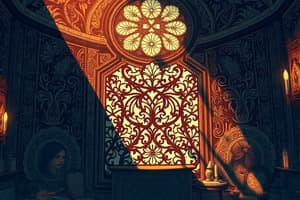Podcast
Questions and Answers
What is the angle of incidence in a ray diagram?
What is the angle of incidence in a ray diagram?
- The angle created by the light source and the surface
- The angle formed by the shadows cast by an object
- The angle between the incident ray and the normal (correct)
- The angle between the reflected ray and the surface
What describes a plane mirror?
What describes a plane mirror?
- A mirror with a flat reflective surface (correct)
- A mirror made from translucent materials
- A mirror that curves inward
- A mirror that reflects light in multiple directions
What causes shadows to form?
What causes shadows to form?
- The absorption of light by transparent objects
- The reflection of light waves on a surface
- The blocking of light waves by an opaque object (correct)
- The bending of light around an object
What is the correct description of the normal in a ray diagram?
What is the correct description of the normal in a ray diagram?
Which statement accurately describes light traveling through a medium?
Which statement accurately describes light traveling through a medium?
Flashcards
Incident Ray
Incident Ray
The path of light traveling from a source to a surface.
Angle of Incidence
Angle of Incidence
The angle formed between the incident ray and the normal, a line perpendicular to the surface.
Normal
Normal
A line perpendicular to the surface where light hits.
Reflected Ray
Reflected Ray
Signup and view all the flashcards
Angle of Reflection
Angle of Reflection
Signup and view all the flashcards
Study Notes
Reflection of Light
- Incident Ray: A ray of light traveling toward a surface
- Angle of Incidence: The angle between the incident ray and the normal line.
- Normal: A line perpendicular to the surface at the point where the ray strikes.
- Reflected Ray: A ray that bounces off the surface, originating at the point where the incident ray meets the normal.
- Angle of Reflection: The angle between the reflected ray and the normal.
- Plane Mirror: A mirror with a flat reflective surface.
- Reflection: The change in direction of a wave as it bounces off a surface.
Shadows
- Shadows: Formed when light is blocked by an opaque object.
- Object Proximity and Shadow Size: Objects closer to the light source produce larger shadows; objects further away, smaller shadows.
- Light Straight-Line Travel: Light travels in a straight line as long as it remains in the same medium.
- Medium: The substance through which light travels.
Studying That Suits You
Use AI to generate personalized quizzes and flashcards to suit your learning preferences.




